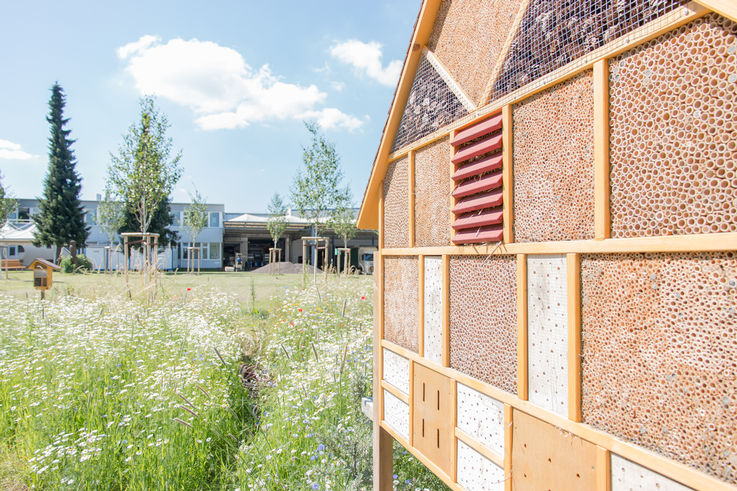New employees, focused on sustainability
At our company, sustainability and diversity are key values. Because of this, we had our partner beefuture set up 5 bee hives to support our smallest, winged assistants. beefuture GmbH works sustainably for bee conservation, and offers companies a unique opportunity to join their important mission. The experienced team at beefuture provides professional care for threatened insects year-round. Of course, GEZE is taking part in this initiative. With this project, we are not only emphasising our commitment to nature, but also making an active contribution to protecting bees and their habitats.
Working for wild bees

Sustainability
Bees have always been considered good luck, and are essential to our ecosystem as pollinators. Because of this, and as part of our 160th anniversary celebration, we asked beefuture to set up five beehives, then welcomed our little assistants! In addition, our Leonberg site boasts a diverse biotope with two bee and insect hotels, a pond with reeds, shrubs, and plantings that produce food for the bees. Rare trees and bushes have also found a home here, and create an attractive ecosystem we have consciously decided to maintain without the use of pesticides. A meadow of wild flowers, bushes, and shrubs provide food for our flying pollinators. With this diversity, we are making an active contribution to protecting threatened insects like wild bees.
From the beehive to the jar

Beekeepers from beefuture teach valuable information about GEZE's bees. © GEZE GmbH

© beefuture GmbH
Our GEZE honey, available for retail sales, is a unique, natural and regional product containing no added sugar. We promise you will enjoy our delicious honey, thanks to our ecological bee-keeping practices, hand-harvesting techniques, and voluntary quality controls. Our climate-neutral GEZE year-round honey was sold to employees in the cafeteria in October. We collected an impressive total donation of € 1,516.93 from the sale for our bee rescuers, with an additional € 2,000 added by our board of management.
Our GEZE honey harvesting event in late October was a sweet experience, allowing over 75 participants to learn more about the fascinating world of bees. Beekeepers from our partner beefuture took guests along on an exciting journey through the year of a bee, teaching valuable information about our GEZE bees and their important work. The highlight of the event was certainly the demonstration of how the honey is extracted, which showed participants how honey is removed from the honeycomb live and in person. GEZE’s honey impresses thanks to its pure quality and unadulterated taste, direct from our own bee hives. In contrast to many types of honey available in retail stores, our GEZE honey is free from added sugar, and we use only eco-friendly bee keeping practices. Our employees’ families were welcome at the event as well. A total of 26 children were able to build an insect hotel, become junior bee keepers and help extract the honey, and of course snack on freshly harvested honey as well.
Sales of our GEZE honey not only benefit our employees, but also support the non-profit “Bienenretter” (bee rescuer) educational and ecological project. This commitment is supported by educational sponsorships that raise awareness about how important bees are to our environment among preschool and school-aged children. With the honey harvesting event, and through sales of our GEZE honey, we are not only demonstrating our commitment to nature and sustainability, but also taking an active role in protecting bees and in environmental education. Our work to support bees is part of our holistic commitment to sustainability and environmental and climate protection. We are taking on comprehensive responsibility, and actively working to ensure an intact, healthy natural world in many areas.
Fun facts about bees
- Bees travel around 150,000 kilometres – the same as flying around the Earth about three times – and visit around five million flowers to produce a single jar of honey. One bee can travel about 8,000 kilometres during its lifetime, so it takes a whole hive to produce a jar of honey.
- Summer bees live around 4 weeks, while winter bees live about 6 months.
- A queen bee can live to be 3-5 years old.
- One third of global food production is dependent on bees and other insects.
- Over 80% of domestic flowering plants are dependent on pollination by bees.



